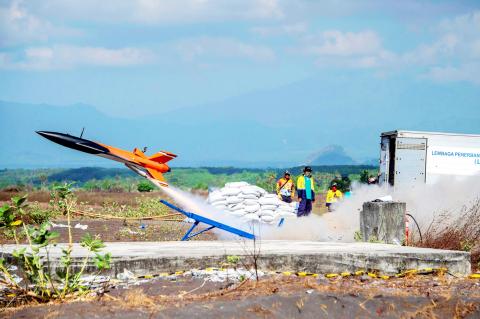Workers snap the miniature rocket’s wings into place as Indonesia’s little-known space agency readies its latest launch on barren scrubland in East Java.
With a 3, 2, 1 blast-off, the 2m projectile belches a trail of fire and then soars a few hundred meters before crashing in a heap — earning a thumbs up from scientists who declared the test a success.
It is a very long way from a Mission Control in Houston, but the Southeast Asian archipelago’s answer to NASA has big hopes and is now planning to build its first spaceport on a tropical island off the coast of easternmost Papua.

Photo: AFP
“We’ve got a dream to put our own satellite-launching rocket 200 or 300 kilometers into space within five years,” said Lilis Mariani, head of the Rocket Technology Centre at the National Institute of Aeronautics and Space (LAPAN).
Some experts question how realistic that timeline is, and officials acknowledge much will depend on whether Jakarta stumps up the necessary funds.
There is resurgent international interest in space travel and colonization, with NASA planning to send two astronauts to the moon by 2024, about 55 years after their last mission there.
LAPAN is a relative minnow, dwarfed in Asia by counterparts in Japan, China and India. It has had some success with developing research satellite technology, but it wants to make its mark in space flight by sending a homegrown rocket into orbit.
At the launch site on East Java, LAPAN’s scientists were gauging the tiny test rocket’s speed, movement and other specifications.
“It was stable on takeoff and moved well,” rocket control program head Sri Kilawati said.
“The objective was to study rocket control. They travel at a very high rate of speed so you’ve got to observe their behavior,” she added.
Achieving a real life launch in five years requires a giant leap, said Lavi Zuhal, head of aerospace engineering at the Bandung Institute of Technology.
“LAPAN is still far behind in terms of launch technology, although it has been quite successful in developing satellites,” he said. “The engineers at LAPAN haven’t fully mastered rocket technology yet.”
Kilawati acknowledged that reaching Indonesia’s ambitions for a state-of-the-art launch center is not just about technological prowess.
“Funding comes from state coffers so it depends a lot on the government’s priorities,” she said.
Still, the East Java rocket test underlined Indonesia was pushing toward the orbital launch goal, even if a five-year timeline was ambitious, said Leena Pivovarova, an analyst at US-based Northern Sky Research.
“In the grand scheme of rocket development you can think of this as a step in the right direction,” she said. “This is toward a larger purpose of achieving orbital launch capability.”
Indonesia’s space aspirations began in the early 1960s with the creation of LAPAN and it was one of the first developing nations to have communications satellites launched into space by the US, where they were made.
It planned to send an astronaut into space with NASA, but the bid was shelved in the wake of the 1986 Challenger shuttle crash and no other chances have come to pass.
However, LAPAN is now talking to its Russia counterpart about sending one of its astronauts on a future mission — although there are few concrete details so far.
Indonesia has cooperated on technology with counterparts in the US, Germany, Japan and the Ukraine among others over the years. Two of its homegrown satellites — used in research to mitigate natural disasters — were launched into orbit by India in 2015.
However, the lack of infrastructure remains a serious problem.
In November last year, Indonesia finally confirmed plans to construct its first spaceport off the coast of Papua, acknowledging that its existing launch site is too risky for large rocket launches because it is too small and in a densely populated area.

The Philippine Department of Justice yesterday labeled Vice President Sara Duterte the “mastermind” of a plot to assassinate the nation’s president, giving her five days to respond to a subpoena. Duterte is being asked to explain herself in the wake of a blistering weekend press conference where she said she had instructed that Philippine President Ferdinand Marcos Jr be killed should an alleged plot to kill her succeed. “The government is taking action to protect our duly elected president,” Philippine Undersecretary of Justice Jesse Andres said at yesterday’s press briefing. “The premeditated plot to assassinate the president as declared by the self-confessed mastermind

CHAGOS ISLANDS: Recently elected Mauritian Prime Minister Navin Ramgoolam told lawmakers that the contents of negotiations are ‘unknown’ to the government Mauritius’ new prime minister ordered an independent review of a deal with the UK involving a strategically important US-UK military base in the Indian Ocean, placing the agreement under fresh scrutiny. Under a pact signed last month, the UK ceded sovereignty of the Chagos archipelago to Mauritius, while retaining control of Diego Garcia — the island where the base is situated. The deal was signed by then-Mauritian prime minister Pravind Jugnauth and British Prime Minister Keir Starmer on Oct. 3 — a month before elections in Mauritius in which Navin Ramgoolam became premier. “I have asked for an independent review of the

Czech intelligence chief Michal Koudelka has spent decades uncovering Russian spy networks, sabotage attempts and disinformation campaigns against Europe. Speaking in an interview from a high-security compound on the outskirts of Prague, he is now warning allies that pushing Kyiv to accept significant concessions to end the war in Ukraine would only embolden the Kremlin. “Russia would spend perhaps the next 10 to 15 years recovering from its huge human and economic losses and preparing for the next target, which is central and eastern Europe,” said Koudelka, a major general who heads the country’s Security Information Service. “If Ukraine loses, or is forced

THIRD IN A ROW? An expert said if the report of a probe into the defense official is true, people would naturally ask if it would erode morale in the military Chinese Minister of National Defense Dong Jun (董軍) has been placed under investigation for corruption, a report said yesterday, the latest official implicated in a crackdown on graft in the country’s military. Citing current and former US officials familiar with the situation, British newspaper the Financial Times said that the investigation into Dong was part of a broader probe into military corruption. Neither the Chinese Ministry of Foreign Affairs nor the Chinese embassy in Washington replied to a request for confirmation yesterday. If confirmed, Dong would be the third Chinese defense minister in a row to fall under investigation for corruption. A former navy